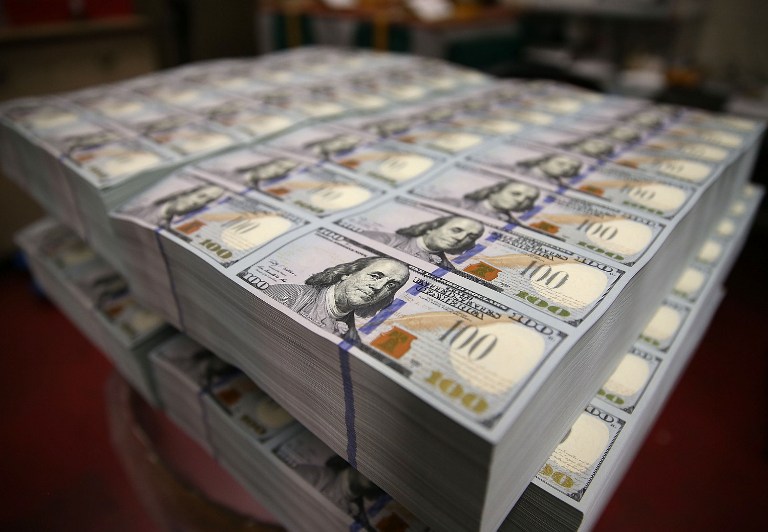The dollar declined from a seven-week high as investors braced for the Federal Reserve policy decision this week and Goldman Sachs Asset Management said a rally that propelled the dollar to a seven-week high will fizzle.
The money manager said it expects the U.S. central bank to forgo an interest-rate increase this week, in line with the median forecast in a Bloomberg survey, even after a report Sept. 16 showing U.S. inflation rising faster than economists forecast drove the greenback higher. Hedge funds and other speculative investors trimmed bullish dollar positions last week as they awaited comments from policy makers about the path of interest rates.
Parent Goldman Sachs Group Inc. cut its forecasts for gains in the U.S. currency versus the yen, saying it is “not optimistic” about the outcome of the Bank of Japan’s policy meeting this week.
“Over the medium to longer term, we continue to expect U.S. dollar weakness versus G-10 and emerging-market currencies,” the asset-management firm said in a note to clients dated Sept. 16. “We expect no move in September but anticipate the Fed will signal that a rate hike is still possible this year, while the pace of tightening will be even more shallow and gradual than previous Fed projections.”
The dollar weakened 0.1 percent to $1.1166 per euro as of 8:48 a.m. New York time and fell 0.5 percent to 101.77 yen. The Bloomberg Dollar Spot Index fell 0.3 percent from Sept. 16, when it jumped 0.7 percent to close at its highest level since July 28.
Hedge Funds
Hedge funds and other large speculators cut net bullish positions on the dollar for the week ended Sept. 13, according to data from the Commodity Futures Trading Commission. Bets that the dollar would rise outnumbered bearish positions by 113,195 contracts, down from 119,066 in the previous period.
Fed Fund futures imply a one-in-five chance of Fed action Wednesday and a 55 percent chance by year-end.
Since boosting interest rates last December, Fed policy makers have refrained from a subsequent hike, with external factors from Brexit to concerns over global growth staying their hand. Later this year, the U.S. election might deter them, according to Neil Jones, head of hedge fund sales at Mizuho Bank Ltd. in London.
Polls show the presidential race is getting tighter, clouding the outlook for U.S. Policy beyond November’s vote. Citigroup Inc. reduced its forecast of the likelihood of a Hillary Clinton victory to 60 percent from 65 percent, with a 40 percent probability of a victory by Donald Trump, analysts led by Tina Fordham wrote in client note.
“Many still believe a December rate hike is on the cards, but some might be cautious because policy makers have told the market they were ready to raise rates this year but that has not happened,” said Mizuho’s Jones. “I see politics in the U.S. as a risk. It may deter the Fed from delivering a rate increase.”
The BOJ decides policy the same day as the Fed this week, with forecasts for action by analysts ranging widely. That is complicating the job of currency traders trying to position for the event. Japan became the epicenter of a global bond selloff this month, amid speculation the central bank will pull back from buying long-term bonds after Governor Haruhiko Kuroda ordered a comprehensive review of its easing program.
‘Broad Range’
“The U.S. dollar is going to trade in a broad range, capped by Fed inaction on the one side, and the potential for heightened volatility on the other,” said Daniel Been, head of foreign exchange research at Australia & New Zealand Banking Group Ltd. in Sydney. “The BOJ and the potential for them to drive a larger global steepening is the bigger event.”
Goldman Sachs, the investment bank, is taking the view that Japan’s central bank “will continue to ease at upcoming meetings,” likely by further cuts to the deposit rate, but it won’t be enough to reverse the “adverse dynamic” created in January, with the introduction of a negative interest-rate policy. The Wall Street firm cut its three-month forecast for the dollar to 108 yen from 115 yen, and its 12-month prediction to 115 yen from 125 yen.
“Focus at the BOJ has shifted toward making the existing policy stance sustainable, as opposed to adding stimulus to meet the inflation target,” Goldman Sachs analysts led by Robin Brooks wrote in a note dated Sept. 18. “We are not optimistic.”


 Forex3 weeks ago
Forex3 weeks ago


 Naira2 weeks ago
Naira2 weeks ago
 Billionaire Watch2 weeks ago
Billionaire Watch2 weeks ago




 Naira2 weeks ago
Naira2 weeks ago




 Naira2 weeks ago
Naira2 weeks ago




 Naira1 week ago
Naira1 week ago




 Naira3 weeks ago
Naira3 weeks ago




 Naira4 weeks ago
Naira4 weeks ago





















